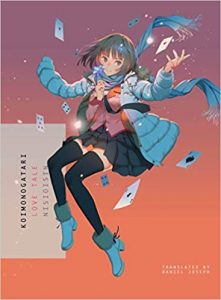By NISIOISIN and VOFAN. Released in Japan by Kodansha. Released in North America by Vertical, Inc. Translated by Daniel Joseph.
I am occasionally asked by those who have seen the Monogatari Series anime if it is worth getting the novels. SHAFT has done a decent job of adapting the series, and many of its eccentricities are more beloved than the original book (lampshaded here, as Araragi notes that the bathroom in their house is not nearly as grand as the anime made it out to be). In fact, as this was being written, Nisemonogatari had just finished, and Nisioisin’s self-deprecation comes into play here, as there are many “the anime’s over now” comments, and he asks for alarm clocks to wake him with the sounds of Karen and Tsukihi’s voice actors. The anime, of course, was nowhere near over. But back to my original question… You should read the books if you like words. Playing with words, extemporizing endlessly, dancing around what you really want to say, and hitting the fourth wall with a sledgehammer. The Monogatari novels do not let the reader simply coast along and take in the plot. Which is good, as the plot in this particular book is almost absent.
Yotsugi and her master are on the cover of this book, and technically Yotsugi is the “star”. It’s worth noting, though, that the book begins with what might be termed a “sequel” to Nekomonogatari Black, as Araragi and Tsukihi spend about fifty pages trying to verbally one-up each other as they compete to see who takes the bath first, then compromise and bathe together. As I said earlier, Nisemonogatari had just aired its anime, and I imagine the “toothbrush” scene had become the meme that it still is today. So there’s lots of “I don’t love my sister that way, but” stuff here, which would be far more annoying if the two involved weren’t bantering up a storm throughout. The main thrust of the plot, though, comes when Araragi looks in a mirror while bathing and notices… he doesn’t have a reflection. He seeks out advice form Kagenui, who informs him that he’s been abusing his “sorta vampire” powers so much – especially when he let Sengoku kill him over and over again for a month – that he’s almost a full vampire again.
This is not a problem that’s easily resolved, which is good as this is the first book of the “Final Season”, which is meant to wrap up the series as a whole. (It does not remotely do this.) By the end of the book, Araragi is not magically “cured”, and the one thing he can do going forward is simply stop using said powers as a crutch. Naturally, the moment he resolves to do this, his sisters and Kanbaru are kidnapped by a villain with so little presence that he even comments on the fact, saying that he and Araragi have been set up to have a villainous confrontation. Could there be someone pulling the strings? Readers who have been following the last three books have pretty much thought “it’s Ogi, isn’t it?”, and it certainly looks so here too, as she confronts Araragi just before he goes to save the day and talks about her own nature a bit. There’s also a rather dark and startling solution to the problem, meant to drive a wedge between Araragi and Yotsugi.
Even for a series as wordy as Monogatari, this was pretty damn wordy, and you should obviously only read it after the other books. As for what happens next, we’ll have to wait till the fall to find out, as over the summer we have the traditional short story volume – or volumes, as the case may be.



